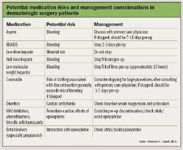- Case-Based Roundtable
- General Dermatology
- Eczema
- Chronic Hand Eczema
- Alopecia
- Aesthetics
- Vitiligo
- COVID-19
- Actinic Keratosis
- Precision Medicine and Biologics
- Rare Disease
- Wound Care
- Rosacea
- Psoriasis
- Psoriatic Arthritis
- Atopic Dermatitis
- Melasma
- NP and PA
- Skin Cancer
- Hidradenitis Suppurativa
- Drug Watch
- Pigmentary Disorders
- Acne
- Pediatric Dermatology
- Practice Management
- Prurigo Nodularis
- Buy-and-Bill
Article
Making the most of pre-op evaluation
Wilkes-Barre, Pa. - A careful preoperative evaluation to acquire a thorough understanding of individual risk factors is the foundation for success when performing dermatologic surgery in older patients, Christine E. Cabell, M.D., tells Dermatology Times.

"Because of medical comorbidities, concomitant medications and age-related physiological changes, surgery in older patients can be associated with a number of challenges and concerns. Knowledge of these factors enables appropriate decision making regarding treatment options and the need for additional measures to maximize patient comfort and safety," comments Dr. Cabell, chief, dermatologic surgery, Geisinger Wyoming Valley Medical Center, Wilkes Barre, Pa.
Maximize communication
To enhance communication efforts, the physician should sit face to face with the patient, speak slowly and try to include a family member or a caregiver in the visit as often as possible.
"It is important to speak slowly and reiterate key points. In a study published a few years ago in which older patients were presented once with a list of 10 risks prior to dermatologic surgery, only about a quarter of the information relayed was retained one week later," Dr. Cabell notes.
Surgeons should also be aware that older patients may be especially prone to having an exaggerated "white coat syndrome," and so may hesitate to ask questions and be reluctant to express pain. They may also have a deep rooted fear of cancer as a result of knowing friends and relatives who died from malignancies.
"Therefore, for the patient with skin cancer, it is important to be explicit about the diagnosis, long-term implications and treatment," Dr. Cabell says.
Don't overlook life quality factors
Not to be overlooked among older patients are concerns about postoperative functioning and appearance.
"Try to determine if the patient is particularly concerned about cosmesis or might be upset if the surgery disrupts participation in certain activities. See if you can plan the surgery around those factors," Dr. Cabell says.
In aiming to make the procedure safer and more comfortable, there are a number of age-related physiological changes to consider. Older patients may have an altered baroreceptor response, decrements in all sensory functions, and may be especially fearful about ocular injury, especially if they have vision loss or a history of ocular surgery. Simple measures to consider include undertaking positioning changes slowly, covering the eyes when possible to protect them and minimizing exposure to bright lights. Dr. Cabell also recommends documenting, preoperatively, any existing ectropion, nerve paralysis or visual deficits when operating in the periocular region.
With their decreased metabolic rate, the elderly are sensitive to colder temperatures, so the room should be kept warm and extra blankets made available.
Decreases in hepatic and renal function with age may affect elimination of a variety of drugs used in surgery - including amide anesthetics, sedatives, anxiolytics and nonsteroidal anti-inflammatory drugs - may mandate dosage adjustment. Patients with pulmonary disease should be kept in a sitting position if possible, although there is no need to obtain a screening chest x-ray.
Oxygen can be used with a nasal cannula during surgery, but it should be turned off and the tubing removed from the nose prior to cautery. Eliciting a history of smoking and diabetes is important because those factors affect wound healing.
"I naturally encourage smoking cessation and often consider postoperative antibiotics in diabetics, especially if the procedure is larger or more prolonged. I also counsel diabetics to eat breakfast and take their medications as they normally would before the procedure and have snacks on hand for long procedures," Dr. Cabell says.





